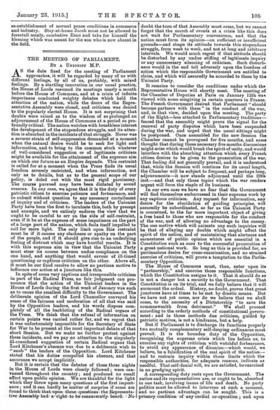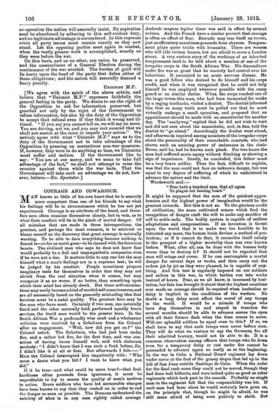A S the date fixed for the meeting of Parliament approaches,
it will be regarded by many of us with different feelings, by all of us, probably, with mixed feelings. By a startling innovation in our usual practice, the House of Lords resumed its meetings nearly a month before the House of Commons, and at a crisis of infinite importance conducted weighty debates which held the attention of the nation, while the doors of the Repre- sentative Assembly were closed, and criticism was denied to the popularly elected House. It is not surprising that doubts were raised as to the wisdom of so prolonged an adjournment of the House of Commons at a period so pro- foundly critical. The nation watches with breathless interest the development of the stupendous struggle, and its atten- tion is absorbed in the incidents of that struggle. Never was a severer strain of self-suppression demanded at a moment when the natural desire would be to seek for light and information, and to bring to the common stock whatever of well-considered suggestion or of legitimate criticism might be available for the attainment of the supreme aim on which our future as an Empire depends. This restraint is called for at a moment when the Press finds its usual freedom severely restricted, and when information, not only as to details, but as to the general scope of our policy, is doled out with the most rigid parsimony. The course pursued may have been dictated by sound reasons. In any case, we agree that it is the duty of every patriotic citizen to exercise patience and forbearance, and to submit without question to any necessary curtailment of inquiry and of criticism. The leaders of the Unionist Party have been the first to inculcate this, both by precept and example, and we entirely endorse the view that we ought to be careful to err on the side of self-restraint, even if it be at the expense of some impatience on the part of a large part of the nation, which feels itself impelled to call for more light The only limit upon this restraint must be if it causes any slackness or apathy on the part of the people, and if it should give rise to an underlying feeling of distrust which may have hurtful results. It is with this supreme aim in view that the Unionist Party must steer ite course between undue compliance on the one hand, and anything that would savour of ill-timed questioning or captious criticism on the other. Above all, it must be our fixed resolve to allow no partisan motive to influence our action at a juncture like this.
In spite of some very captious and irresponsible criticism in part of the Radical Press, no fair judgment can pro- nounce that the action of the Unionist leaders in the House of Lords during the first week of January was such as to cause the smallest difficulty to the Government. The deliberate opinion of the Lord. Chancellor conveyed his sense of the fairness and moderation of all that was said by the Opposition leaders, and his words dispose com- pletely of all the backbiting of the Radical organs of the Press. We think that the refusal of information on certain points was carried rather far, and we regret that it was unfortunately impossible for the Secretary of State for War to be present at the most important debate of that short Session. But we make no further protest against these incidents, and we pay no attention to the singularly ill-considered suggestion of certain Radical organs that Lord Kitchener's absence was due to a deliberate wish to "snub" the leaders of the Opposition. Lord Kitchener stated that his duties compelled his absence, and that assurance we accept implicitly.
But it is certain that the debates of these three nights in the House of Lords were closely followed ; were can- vassed throughout the country ; and produced no small effect upon public opinion. We are thankful for the light which they threw upon many questions of the first import- ance ; and it can hardly be matter of surprise if some are found to thinkthat upon these. questions x the-Representa- tive Assembly had a-right-to to concerrentiy. heard.- ■ No doubt the turn of that Assembly must come, but we cannot forget that the march of events at a crisis like this does not wait for Parliamentary convenience, and that the nation must form its opinion—on sufficient or insufficient grounds—and shape its attitude towards this stupendous struggle, from week to week, and not at long and arbitrary intervals. We would much regret if that attitude should be disturbed by any undue stifling of legitimate inquiry or any unnecessary silencing of criticism. Such disturb- ance would in the end tell adversely upon the freedom of action which the responsible Government are entitled to claim, and which will assuredly be accorded to them by the Unionist Party.
It remains to consider the conditions under which the Representative House will shortly meet. The meeting of the Chamber of Deputies at Paris on January 12th was viewed with some misgiving in certain quarters in France. The French Government desired that Parliament " should become partners with them" in the conduct of the war, and, in that view, decided upon the meeting. The party of the Right—less attached to Parliamentary traditions— feared that the assembly might prove the signal for the renewal of party disputes which have been suspended during the war, and urged that the usual sittings might be postponed. Once assembled for the new Session the Chamber cannot be prorogued for five months, and some thought that during these necessary five months discussions might arise which would break the spirit of unity, and would interfere with the absorbing attention which every French citizen desires to be given to the prosecution of the war. That feeling did not generally prevail, and it is understood that, while the Session will continue for its usual length, the Chamber will be subject to frequent, and perhaps long, adjournments—it now stands adjourned until the 28th inst.—and that only those topics which the war renders urgent will form the staple of its business. In our own case we have no fear that the Government will find themselves embarrassed in their supreme work by any captious criticism. Any request for information, any desire for the elucidation of guiding principles, will assuredly be subordinated, so far as the Unionist Party is concerned, to the far more important object of giving a free hand to those who are responsible for the conduct of the war, and of allowing no advantage to the enemy. The one motive which will animate any such inquiries will be that of allaying any doubts which might affect the spirit of the nation, and of maintaining that alertness and earnestness of public opinion which are essential in Constitution such as ours to the successful prosecution of a great national work. So long as this is provided for, no pertinacious desire for cross-examination, and no strained exercise of criticism, will prove a temptation to the Parlia- mentary Opposition.
The House of Commons must, then, enter upon its "partnership," and exercise those responsible functions, which the Constitution assigns to it. That it should do so is not a danger but a security to the Government. That Constitution is on its trial, and we fully believe that it will surmount the ordeaL History, no doubt, proves that great junctures have at times to be met by drastic means. But we have not yet come, nor do we believe that we shall come, to the necessity of a Dictatorship "to save the commonwealth from detriment." We shall proceed according to the orderly methods of constitutional govern- ment: and in those methods due criticism, guided by patriotic motives, is not a hindrance, but a help.
But if Parliament is to discharge its functions properly two mutually complementary self-denying ordinances must prevail. It is the bounden duty of the Opposition, recognizing the supreme crisis which lies before us, to exercise any rights of criticism with watchful forbearance, to avoid any appearance of disunion—which would, we believe, be a falsification of the real spirit of the nation— and to restrain inquiry within those limits which the responsible authorities, for adequate reasons, indicate as needful. That self-denial will, we are satisfied, be exercised in no grudging spirit. A corresponding duty rests upon the Government. The nation audits representatives are, or ought to be, absorbed in one task, involving issues of life and death. No party politics must be allowed to intervene at such a moment, end, no partisan advantage. can be sought. This is a primary condition -of any cordial co-operation ; and upon
co-operation the nation will assuredly insist. No aspiration need be abandoned by adhering to this self-evident duty, and no legitimate advantage is surrendered. In this supreme crisis all party issues must remain exactly as they now stand. Let the opposing parties meet again in combat, when the vastly greater work is accomplished, exactly as they were before the war.
On this basis, and on no other, can union be preserved, and the unseemliness of a General Election during the continuance of the war avoided. The burden of guilt will lie heavy upon the head of the party that defies either of these obligations ; and the nation will assuredly demand a heavy penalty. UNIONIST M.P.
[We agree with the spirit of the above article, and believe that " Unionist M.P." expresses faithfully the general feeling in the party. We desire to see the right of the Opposition to ask for information preserved, but guarded not only by the right of the Government to refuse information, but also by the duty of the Opposition to accept that refusal even if they think it wrong and ill- timed. "If you say you cannot tell us, we will say no more. You are driving, not we, and you may rest assured that we shall not snatch at the reins or impede your action." We entirely agree with what " Unionist M.P." says as to the duty of the Government not to take advantage of the Opposition by pressing on contentious non-war measures. If, however, they were to do anything so base, we Unionists must suffer and endure. If the Government like to say " You are at our mercy, and we mean to take full advantage of the fact," we shall not attempt to raise the country against them while the war lasts. That the Government will take such an advantage we do not, how- ever, believe.—En. Spectator.]



































 Previous page
Previous page